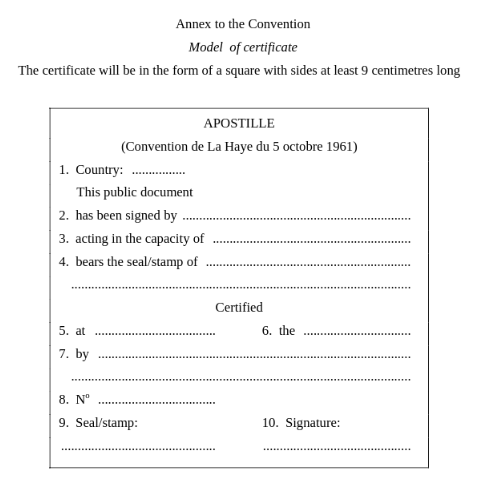|
10. Foreign Documents in Brazil - Haia Appostile, Legalisation, Sworn Translation
10.1. Foreign Public Document: Brazil has signed and enforced (Decree 8.660/2016) the Convention of Haia, aiming to Abolishing the requirement of Legalisation for this kind of document. With this, in Brazil, "public documents which have been executed in the territory of one Contracting State" shall be accepted with the Haia Apostille, a kind of Annotation with a Seal, which one attest the veracity of the signature, quality and authenticity of the foreign public document. The Appostile of a foreign document shall be done in the foreign country. According to the Convention, "the following are deemed to be public documents:
a) documents emanating from an authority or an official connected with the courts or tribunals of the State, including those emanating from a public prosecutor, a clerk of a court or a process-server;
b) administrative documents;
c) notarial acts;
d) official certificates which are placed on documents signed by persons in their private capacity, such as official certificates recording the registration of a document or the fact that it was in existence on a certain date and official and notarial authentications of signatures.
However, the present Convention shall not apply:
a) to documents executed by diplomatic or consular agents;
b) to administrative documents dealing directly with commercial or customs operations".

* Example of documents: Birth/Death certificates, Marriage certificates, Court decisions, Certificates of criminal records
** For the list of Haia's Convention Contracting Parties, including the countries which ones the Convention entered into force or not, check "https://www.hcch.net/en/instruments/conventions/status-table/?cid=41".
10.2. Legalisation: it is a formality by which the Brazilian diplomatic/consular agents of the foreigner country in which the document has to be produced (e.g. Brazilian Consulate in Netherlands) certify the authenticity of the signature and the identity of the seal or stamp of the foreigner notary/public authority. Brazil recognizes the authenticity of the notarization act done in the foreigner country. For example, a Private Power of Attorney (PoA) signed outside Brazil shall be notarized in the foreign country, after should be under legalisation in the Brazilian Consulate (if Haia Convention do not works for that jurisdiction), then shall occur a sworn translation in Brazil, and in the case of a PoA should be recorded in a Brazilian notary.
10.3. Sworn Translation: "In Brazil, foreign documents, even apostilled, are only able to take effect with the respective sworn translation. This, in turn, can only be carried out in Brazil. The matter is regulated by Article 192 of the Code of Civil Procedure, Art. 236 of the Code of Criminal Procedure, Decree 13,609/1943..." (Brazilian National Council of Justice - CNJ). Sworn translator: "The profession of Translator and Public Interpreter will be exercised upon registration by the Commercial Board, as a result of approval in a competition to assess aptitude" (IN DREI/ME n° 52/2022).
|

